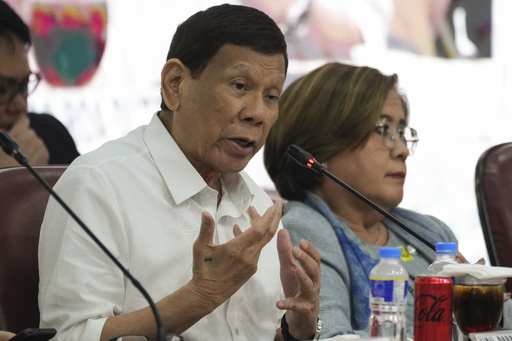
The Philippine administration declared on Wednesday that its law enforcement bodies will be required to collaborate if the International Criminal Court (ICC) requests custody of former President Rodrigo Duterte in connection with an inquiry regarding thousands of fatalities linked to his anti-drug campaign.
The ICC, located in The Hague, is examining the extensive killings that occurred during Duterte’s tenure as mayor of Davao and later as president from 2016 through 2020, which may constitute crimes against humanity.
Human rights advocates suggest that the death toll could surpass 20,000 during Duterte’s presidency. This violent initiative raised concerns among Western nations and led to a series of complaints, prompting the ICC to pursue an investigation. The ICC serves as a last resort for addressing crimes that nations are either unwilling or unable to investigate on their own.
During a heavily scrutinized televised congressional inquiry on Wednesday, Duterte delivered inconsistent remarks regarding his willingness to submit to the investigation by the global body. “The ICC does not intimidate me. They are welcome to come here anytime,” he stated to the House of Representatives. “I urge the ICC to expedite their investigation and begin as soon as tomorrow.”
He went on to express urgency: “This matter has been lingering for countless years, and I might not have much time left,” added the 79-year-old former leader. “If I am found guilty, I can accept my sentence and endure it for life.”
Nevertheless, Duterte also mentioned that he would physically confront any ICC investigator attempting to approach him.
Executive Secretary Lucas Bersamin, the highest-ranking official in the Cabinet, remarked that should Duterte express a desire to submit to ICC jurisdiction, the government would neither obstruct nor inhibit his wishes.
“However, if the ICC forwards the process to Interpol, which may issue a red notice to the Philippine authorities, we will have to view that notice as a request that needs to be addressed,” Bersamin explained. “In such a scenario, domestic law enforcement must provide full cooperation with Interpol in line with established protocols.”
A red notice alerts global law enforcement to locate and temporarily detain an individual pending extradition or surrender.
Duterte opted out of the ICC in 2019, an action that activists claim was a strategy to dodge accountability and prevent an international examination of the drug-related killings. However, the ICC retains authority over alleged offenses committed while the Philippines was still a participant in the court.
His successor, Ferdinand Marcos Jr., has stated that his government has no intention of rejoining the ICC.
Throughout the congressional inquiry, Duterte reiterated a vague commitment under oath to assume full responsibility for the actions—whether they were “right or wrong”—of police personnel who enacted his anti-drug policies during his administration.
When presented with specific instances of violence, Duterte denied direct involvement. He mentioned a past incident where he purportedly threw a suspected criminal from a helicopter as a form of punishment but later characterized that statement as a “hyperbole” and not meant to be taken literally.
